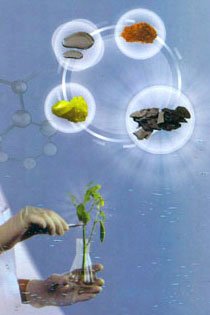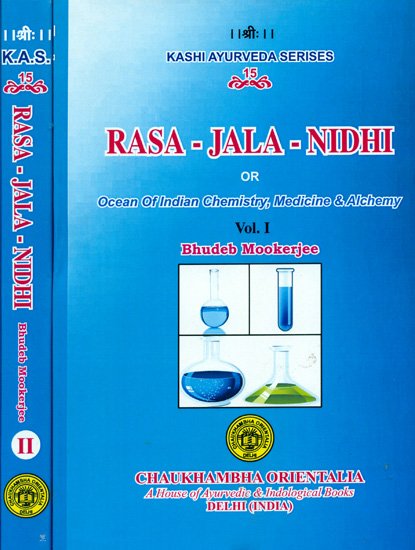Rasa Jala Nidhi, vol 4: Iatrochemistry
by Bhudeb Mookerjee | 1938 | 52,258 words | ISBN-10: 8170305829 | ISBN-13: 9788170305828
This fourth volume of the Rasa-jala-nidhi deals with Rasa-chikitsa-vidya, also known a the science of Iatrchemistry (chemical medicine), a major branch of Ayurveda. It contains Ayurvedic treatments for Fever and Diarrhea. The Rasa-jala-nidhi (“the ocean of Iatrochemistry, or, chemical medicine) is a compendium of Sanskrit verses dealing with ancie...
Part 8 - Directions for using water
Drinking of water during fasting.
One suffering from fever should drink water even when fasting. A thirsty man suffers from bewilderment which in turn causes death. So, under no circumstances, water should be disallowed to patients, when thirsty, except when it is prohibited as an indispensable requirement of using certain class of medicines, named parpati, dugdhabati, etc., which allow only pure milk being drunk instead of water. Drinking water in excess, even in thirst, aggravates kapha and pitta of a man, especially in fever. One suffering from fever should therefore drink water in small quantities, even when thirsty. One suffering from indigestion should never drink water in excess.
Cases for drinking water in small quantity.
Persons suffering from the following disease are to take water in a very small quantity:—fever, eye disease, leprosy, indigestion, udara-roga, aversion to food, catarrh, cough and vomiting, dropsy, phthisis, boils, and diabetes. Those who take clarified butter should not also drink water in excess.
Drinking of cold water is forbidden in nava-jvara, etc.
One should not drink cold water in the following cases:—navajvara, catarrh, pain in the sides, gala-graini (a disease in which tongue comes out every moment and goes inside the mouth, the next moment), inmediately after vomiting, purging, and such other purifying actions; in flatulence, diseases due to an excess of wind and phlegm, aversion to food, chronic diarrhoea, gulma, tumour in abdomen, asthma, cough, bidradhi (a kind of tumour), hiccogh, and after taking clarified butter.
Properties of water cooled after boiling.
Water cooled after boiling is beneficial in the following cases:—burning sensation, diarrhoea, excess of pitta, haematemesis, ailments following drinking of liquor and taking of poison, strangury, jaundice, thirst, vomiting, exhaustion, diseases due to drinking of wine in excess; diseases due to an excess of pitta and of the three doshas. In the present case, water is to be boiled in an earthen vessel, covered with an earthen basin, which is not to be removed so long as the boiled water in the vessel is not completely cooled, after discontinuance of heat. This water pacifies an excess of the three doshas. It does not produce roughness or phlegm in the system. It helps to destroy worms, thirst and fever. It is light. Hot water, cooled by pouring it into one vessel and then into another (backwards and forwards), has the effect of making it so heavy as to remain undigested in the stomach for a long time. Hot water, cooled by fanning, is difficult of digestion. Water boiled at day time but drunk at night is difficult of digestion, and so is water boiled at night and drunk at daytime. The last one of the two is called stale water. It has no digestive property. It rather increases the three doshas, and is difficult of digestion. It causes acidity, flatulence, and is harmful in all diseases. Water cooled after boiling should not be boiled again. If boiled again, it becomes as injurious as poison. Cold decoction, too, act like poison, if heated for the second time.
Persons who should take unboiled cold water.
It is beneficial to drink unboiled cold water in the following cases:—fainting, excess of pitta, excessive bodily heat, impurity of blood, diseases due to drinking of wine, giddiness, exhaustion, asthma of a malignant type, dropsy, smoky belching, vitiation of food undigested, dryness of tongue and throat, and upward hematemesis.
Conclusion:
 This concludes ‘Directions for using water’ included in Bhudeb Mookerjee Rasa Jala Nidhi, vol 4: Initiation, Mercury and Laboratory. The text includes treatments, recipes and remedies and is categorised as Rasa Shastra: an important branch of Ayurveda that specialises in medicinal/ herbal chemistry, alchemy and mineralogy, for the purpose of prolonging and preserving life.
This concludes ‘Directions for using water’ included in Bhudeb Mookerjee Rasa Jala Nidhi, vol 4: Initiation, Mercury and Laboratory. The text includes treatments, recipes and remedies and is categorised as Rasa Shastra: an important branch of Ayurveda that specialises in medicinal/ herbal chemistry, alchemy and mineralogy, for the purpose of prolonging and preserving life.
